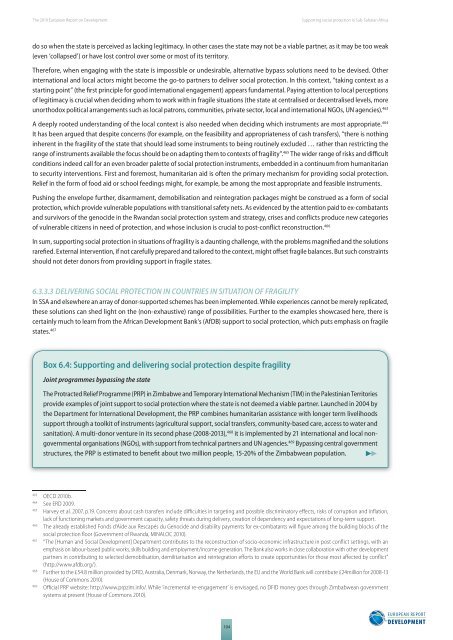social protection for inclusive development - European Report on ...
social protection for inclusive development - European Report on ...
social protection for inclusive development - European Report on ...
You also want an ePaper? Increase the reach of your titles
YUMPU automatically turns print PDFs into web optimized ePapers that Google loves.
The 2010 <str<strong>on</strong>g>European</str<strong>on</strong>g> <str<strong>on</strong>g>Report</str<strong>on</strong>g> <strong>on</strong> Development<br />
Supporting <str<strong>on</strong>g>social</str<strong>on</strong>g> <str<strong>on</strong>g>protecti<strong>on</strong></str<strong>on</strong>g> in Sub-Saharan Africa<br />
do so when the state is perceived as lacking legitimacy. In other cases the state may not be a viable partner, as it may be too weak<br />
(even ‘collapsed’) or have lost c<strong>on</strong>trol over some or most of its territory.<br />
There<str<strong>on</strong>g>for</str<strong>on</strong>g>e, when engaging with the state is impossible or undesirable, alternative bypass soluti<strong>on</strong>s need to be devised. Other<br />
internati<strong>on</strong>al and local actors might become the go-to partners to deliver <str<strong>on</strong>g>social</str<strong>on</strong>g> <str<strong>on</strong>g>protecti<strong>on</strong></str<strong>on</strong>g>. In this c<strong>on</strong>text, “taking c<strong>on</strong>text as a<br />
starting point” (the first principle <str<strong>on</strong>g>for</str<strong>on</strong>g> good internati<strong>on</strong>al engagement) appears fundamental. Paying attenti<strong>on</strong> to local percepti<strong>on</strong>s<br />
of legitimacy is crucial when deciding whom to work with in fragile situati<strong>on</strong>s (the state at centralised or decentralised levels, more<br />
unorthodox political arrangements such as local patr<strong>on</strong>s, communities, private sector, local and internati<strong>on</strong>al NGOs, UN agencies). 463<br />
A deeply rooted understanding of the local c<strong>on</strong>text is also needed when deciding which instruments are most appropriate. 464<br />
It has been argued that despite c<strong>on</strong>cerns (<str<strong>on</strong>g>for</str<strong>on</strong>g> example, <strong>on</strong> the feasibility and appropriateness of cash transfers), “there is nothing<br />
inherent in the fragility of the state that should lead some instruments to being routinely excluded … rather than restricting the<br />
range of instruments available the focus should be <strong>on</strong> adapting them to c<strong>on</strong>texts of fragility”. 465 The wider range of risks and difficult<br />
c<strong>on</strong>diti<strong>on</strong>s indeed call <str<strong>on</strong>g>for</str<strong>on</strong>g> an even broader palette of <str<strong>on</strong>g>social</str<strong>on</strong>g> <str<strong>on</strong>g>protecti<strong>on</strong></str<strong>on</strong>g> instruments, embedded in a c<strong>on</strong>tinuum from humanitarian<br />
to security interventi<strong>on</strong>s. First and <str<strong>on</strong>g>for</str<strong>on</strong>g>emost, humanitarian aid is often the primary mechanism <str<strong>on</strong>g>for</str<strong>on</strong>g> providing <str<strong>on</strong>g>social</str<strong>on</strong>g> <str<strong>on</strong>g>protecti<strong>on</strong></str<strong>on</strong>g>.<br />
Relief in the <str<strong>on</strong>g>for</str<strong>on</strong>g>m of food aid or school feedings might, <str<strong>on</strong>g>for</str<strong>on</strong>g> example, be am<strong>on</strong>g the most appropriate and feasible instruments.<br />
Pushing the envelope further, disarmament, demobilisati<strong>on</strong> and reintegrati<strong>on</strong> packages might be c<strong>on</strong>strued as a <str<strong>on</strong>g>for</str<strong>on</strong>g>m of <str<strong>on</strong>g>social</str<strong>on</strong>g><br />
<str<strong>on</strong>g>protecti<strong>on</strong></str<strong>on</strong>g>, which provide vulnerable populati<strong>on</strong>s with transiti<strong>on</strong>al safety nets. As evidenced by the attenti<strong>on</strong> paid to ex-combatants<br />
and survivors of the genocide in the Rwandan <str<strong>on</strong>g>social</str<strong>on</strong>g> <str<strong>on</strong>g>protecti<strong>on</strong></str<strong>on</strong>g> system and strategy, crises and c<strong>on</strong>flicts produce new categories<br />
of vulnerable citizens in need of <str<strong>on</strong>g>protecti<strong>on</strong></str<strong>on</strong>g>, and whose inclusi<strong>on</strong> is crucial to post-c<strong>on</strong>flict rec<strong>on</strong>structi<strong>on</strong>. 466<br />
In sum, supporting <str<strong>on</strong>g>social</str<strong>on</strong>g> <str<strong>on</strong>g>protecti<strong>on</strong></str<strong>on</strong>g> in situati<strong>on</strong>s of fragility is a daunting challenge, with the problems magnified and the soluti<strong>on</strong>s<br />
rarefied. External interventi<strong>on</strong>, if not carefully prepared and tailored to the c<strong>on</strong>text, might offset fragile balances. But such c<strong>on</strong>straints<br />
should not deter d<strong>on</strong>ors from providing support in fragile states.<br />
6.3.3.3 DELIVERING SOCIAL PROTECTION IN COUNTRIES IN SITUATION OF FRAGILITY<br />
In SSA and elsewhere an array of d<strong>on</strong>or-supported schemes has been implemented. While experiences cannot be merely replicated,<br />
these soluti<strong>on</strong>s can shed light <strong>on</strong> the (n<strong>on</strong>-exhaustive) range of possibilities. Further to the examples showcased here, there is<br />
certainly much to learn from the African Development Bank’s (AfDB) support to <str<strong>on</strong>g>social</str<strong>on</strong>g> <str<strong>on</strong>g>protecti<strong>on</strong></str<strong>on</strong>g>, which puts emphasis <strong>on</strong> fragile<br />
states. 467<br />
Box 6.4: Supporting and delivering <str<strong>on</strong>g>social</str<strong>on</strong>g> <str<strong>on</strong>g>protecti<strong>on</strong></str<strong>on</strong>g> despite fragility<br />
Joint programmes bypassing the state<br />
The Protracted Relief Programme (PRP) in Zimbabwe and Temporary Internati<strong>on</strong>al Mechanism (TIM) in the Palestinian Territories<br />
provide examples of joint support to <str<strong>on</strong>g>social</str<strong>on</strong>g> <str<strong>on</strong>g>protecti<strong>on</strong></str<strong>on</strong>g> where the state is not deemed a viable partner. Launched in 2004 by<br />
the Department <str<strong>on</strong>g>for</str<strong>on</strong>g> Internati<strong>on</strong>al Development, the PRP combines humanitarian assistance with l<strong>on</strong>ger term livelihoods<br />
support through a toolkit of instruments (agricultural support, <str<strong>on</strong>g>social</str<strong>on</strong>g> transfers, community-based care, access to water and<br />
sanitati<strong>on</strong>). A multi-d<strong>on</strong>or venture in its sec<strong>on</strong>d phase (2008-2013), 468 it is implemented by 21 internati<strong>on</strong>al and local n<strong>on</strong>governmental<br />
organisati<strong>on</strong>s (NGOs), with support from technical partners and UN agencies. 469 Bypassing central government<br />
structures, the PRP is estimated to benefit about two milli<strong>on</strong> people, 15-20% of the Zimbabwean populati<strong>on</strong>.<br />
463<br />
OECD 2010b.<br />
464<br />
See ERD 2009.<br />
465<br />
Harvey et al. 2007, p.19. C<strong>on</strong>cerns about cash transfers include difficulties in targeting and possible discriminatory effects, risks of corrupti<strong>on</strong> and inflati<strong>on</strong>,<br />
lack of functi<strong>on</strong>ing markets and government capacity, safety threats during delivery, creati<strong>on</strong> of dependency and expectati<strong>on</strong>s of l<strong>on</strong>g-term support.<br />
466<br />
The already established F<strong>on</strong>ds d’Aide aux Rescapés du Genocide and disability payments <str<strong>on</strong>g>for</str<strong>on</strong>g> ex-combatants will figure am<strong>on</strong>g the building blocks of the<br />
<str<strong>on</strong>g>social</str<strong>on</strong>g> <str<strong>on</strong>g>protecti<strong>on</strong></str<strong>on</strong>g> floor (Government of Rwanda, MINALOC 2010).<br />
467<br />
“The [Human and Social Development] Department c<strong>on</strong>tributes to the rec<strong>on</strong>structi<strong>on</strong> of socio-ec<strong>on</strong>omic infrastructure in post c<strong>on</strong>flict settings, with an<br />
emphasis <strong>on</strong> labour-based public works, skills building and employment/income generati<strong>on</strong>. The Bank also works in close collaborati<strong>on</strong> with other <str<strong>on</strong>g>development</str<strong>on</strong>g><br />
partners in c<strong>on</strong>tributing to selected demobilisati<strong>on</strong>, demilitarisati<strong>on</strong> and reintegrati<strong>on</strong> ef<str<strong>on</strong>g>for</str<strong>on</strong>g>ts to create opportunities <str<strong>on</strong>g>for</str<strong>on</strong>g> those most affected by c<strong>on</strong>flict“<br />
(http://www.afdb.org/).<br />
468<br />
Further to the £54.8 milli<strong>on</strong> provided by DFID, Australia, Denmark, Norway, the Netherlands, the EU and the World Bank will c<strong>on</strong>tribute £24milli<strong>on</strong> <str<strong>on</strong>g>for</str<strong>on</strong>g> 2008-13<br />
(House of Comm<strong>on</strong>s 2010).<br />
469<br />
Official PRP website: http://www.prpzim.info/. While ‘incremental re-engagement’ is envisaged, no DFID m<strong>on</strong>ey goes through Zimbabwean government<br />
systems at present (House of Comm<strong>on</strong>s 2010).<br />
104
















